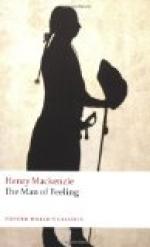It is possible the old gentleman had waked time enough to hear the last part of this discourse; at least (whether from that cause, or that he too was a physiognomist) he wore a look remarkably complacent to Harley, who, on his part, shewed a particular observance of him. Indeed, they had soon a better opportunity of making their acquaintance, as the coach arrived that night at the town where the officer’s regiment lay, and the places of destination of their other fellow-travellers, it seems, were at no great distance, for, next morning, the old gentleman and Harley were the only passengers remaining.
When they left the inn in the morning, Harley, pulling out a little pocket-book, began to examine the contents, and make some corrections with a pencil. “This,” said he, turning to his companion, “is an amusement with which I sometimes pass idle hours at an inn. These are quotations from those humble poets, who trust their fame to the brittle tenure of windows and drinking-glasses.” “From our inn,” returned the gentleman, “a stranger might imagine that we were a nation of poets; machines, at least, containing poetry, which the motion of a journey emptied of their contents. Is it from the vanity of being thought geniuses, or a mere mechanical imitation of the custom of others, that we are tempted to scrawl rhyme upon such places?”
“Whether vanity is the cause of our becoming rhymesters or not,” answered Harley, “it is a pretty certain effect of it. An old man of my acquaintance, who deals in apothegms, used to say that he had known few men without envy, few wits without ill-nature, and no poet without vanity; and I believe his remark is a pretty just one. Vanity has been immemorially the charter of poets. In this, the ancients were more honest than we are. The old poets frequently make boastful predictions of the immortality their works shall acquire them; ours, in their dedications and prefatory discourses, employ much eloquence to praise their patrons, and much seeming modesty to condemn themselves, or at least to apologise for their productions to the world. But this, in my opinion, is the more assuming manner of the two; for of all the garbs I ever saw Pride put on, that of her humility is to me the most disgusting.”
“It is natural enough for a poet to be vain,” said the stranger. “The little worlds which he raises, the inspiration which he claims, may easily be productive of self-importance; though that inspiration is fabulous, it brings on egotism, which is always the parent of vanity.”
“It may be supposed,” answered Harley, “that inspiration of old was an article of religious faith; in modern times it may be translated a propensity to compose; and I believe it is not always most readily found where the poets have fixed its residence, amidst groves and plains, and the scenes of pastoral retirement. The mind may be there unbent from the cares of the world, but it will frequently, at the same time, be unnerved from any great exertion. It will feel imperfect, and wander without effort over the regions of reflection.”




